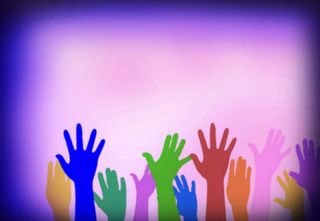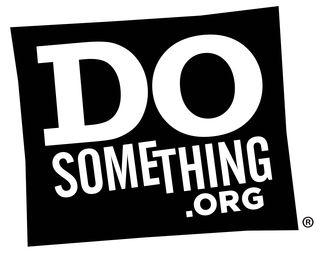Health
Pride in Mental Health: Advocacy
An interview with Transgender Legal Defense & Education Fund and DoSomething.org
Posted June 23, 2017

This week I had the privilege of speaking with experts, activists, and advocates about the various mental health needs we have in the LGBTQ communities, at an event hosted by Crisis Text Line. We all agreed that a supportive and continuous, therapeutic relationship is key, for everyone really. But for those of us who face constant discrimination it can be a matter of life and death. The trouble is that psychotherapy is stigmatized; not enough clinicians are competent, curious, or empathetic enough to make a connection with LGBTQ clients; and too many people simply can’t afford therapy, or their insurance won’t cover it (if they even have insurance). The experts I spoke to all fight tirelessly against these obstacles, in order to connect people to the safe, loving, and supportive relationships they need and deserve.
For this segment of my Pride in Mental Health Series, I talk with Jillian Weiss, Executive Director at Transgender Legal Defense & Education Fund (whose mission is to end discrimination and achieve equality for transgender people), and Calvin Stowell, Chief Growth Officer at DoSomething.org (which motivates young people to make positive change both online and offline through campaigns that make an impact) about the role of advocacy in LGBT mental health.
Jillian, what are the specific mental health needs in the transgender communities right now?
Jillian Weiss: From the vantage point of the work that we do--from the legal end, trying to end discrimination--one of the things we found and that statistics show, is that whenever there is a change in the laws to discriminate against transgender people, or LGBT people in general, there’s an uptick in mental health stigma and crisis and problems. All kinds of data show that this really causes people to spiral downward. And once they experience discrimination, they also experience a decrease in mental health and wellness. And so the work that we’re doing is with people who have experienced the most horrific discrimination, and of course we’re not mental health counselors, but we have to monitor their mental health as best we can, to make sure that all the experiences they’re going through--discrimination, and lawsuits, and being questioned and having to give information, and being subjected to cross examination and so on.

What services would best address those needs?
Jillian Weiss: Well I think it’s very important that they have a therapist. There are various ways to try to afford that, public health centers that are funded by various states and cities. There’s obviously insurance…
If one is lucky enough to have insurance, right? Good care is often not accessible, for various reasons, right?
Jillian Weiss: Well part of the problem is they need a mental health professional who has experience treating transgender issues. Cultural competence. Because that is one of the issues that is going to come up in your interaction with a client who has experienced discrimination and is going through this very very difficult court process. And so if you have someone who doesn’t really know about that --like, “Transgender?... I don’t know about that. What does that mean?” And then they share things about themselves from a transgender point of view and the [uninformed] therapist says, “Why would you think that, or say that, or feel that?” Because they don’t have the competence. So in addition to making sure that they get some kind of care it’s got to be the right kind of care. And in absence of that, someone who has experienced this kind of discrimination--who’s been thrown out of their education, out of their employment, can’t access the healthcare that they need--they obviously are going to be in dire straights mentally. Because you’d have to be very very resilient to survive that [without relational support].
When a therapist is not an option, what types of relational supports are useful and available to people?
Jillian Weiss: Right. Well, putting aside finding a competent, affordable therapist. Relational supports are very very important. So family support is very very critical. To the extent that you can get it… So many people do not have the support of their families. So, that’s a problem. But if you do have family support, and you have someone you can talk to about these experiences, that can be very very helpful. And the support of friends. I’m not just talking about anyone, I mean someone who actually cares about you and understands you and you can talk to them about the things that you experience, and the things that you’re continuing to experience in terms of going back into the job market, going back into school or trying to find a doctor who can help you.
The continuity in that relationship is important right? Having your unique sense of self recognized and reflected back to you on an ongoing basis. That is so undervalued.
Jillian Weiss: And particularly with transgender people because many of them are coming to us because of the discrimination they experienced. Which usually means a huge break [with relational ties]. Because they no longer have family, they no longer have the same friends, they’re not going to have access to financial resources or employment, or educational opportunities. So there’s a huge disruption there, and then they experience discrimination and no one to process it with… that’s rough. [To say the least.]
And this is where advocacy becomes so critical. We need to take care of each other. To be aware of these needs, and step in to offer help. Which brings us to the work you do, Calvin. Tell us about Do Something.
Calvin Stowell: Do Something is the largest youth organization in the country (possibly the world). And what we do is we activate young people around social change. We have five point six million different members in the United States. And we get them involved in cause-based campaigns. Any cause you can imagine. Do Something believes that young people don’t just care about one issue. They care about everything, and want to be involved in everything. This month we have something going on about homophobia, another campaign about body image, another campaign about supporting the mental health of veterans.

What do you mean by “campaign?”
Calvin Stowell: So, what we do is we build a unique call to action that has a verified impact around a specific cause. Say we want to do something around homelessness. Everyone knows that homelessness is bad, but if you ask a thirteen year old to do something tangible around homelessness, they’d probably be like, “Well what can I do, I’m thirteen?” So our job is to take something nebulous, like homelessness--in this case, teen homelessness--and figure out what is something actionable that we can ask our members to do that doesn’t require a car, a parent, or money to participate. Because we want to make sure that everything we do is scalable, and that no matter where you are in the country, you can take part and do something.
How do you identify the need that each campaign addresses?
Calvin Stowell: For teen homelessness, the classic example, we called every shelter in the country to do a survey, that services homeless youth. [Of note: Forty percent of homeless youth served by agencies identify as LGBT and/or Q.] There’s no national shelter registry, and every shelter operates independently. There’s no one person or one database that links them altogether. They’re all independently owned and operated. So we contact them every year and ask what need they have the most right now, or what are young people asking for. It’s funny because everyone wonders if they want a cell phone or a computer. A lot of homeless people have smartphones, that’s how they go online. And they still go to school. So the number one thing to ask for is a pair of jeans, because it’s something you can wear day after day after day. No one’s going to be like, “What are you poor? You wore those jeans yesterday.” So we have to remember to collect jeans. And cool jeans. Normally when you go to a shelter it’s this dowdy donated thing that no one wants to wear. So we get our members to run jean drives in their schools, and year over year, in total we’ve clothed two thirds of the homeless youth population in the country. One month long drive can bring in a million pairs of jeans. And we have to make sure the shelters are ok with us dropping things off. Some of the shelters may be like, “We don’t need that.” And we don’t want to cause more of an issue. A lot of the time when people do drives, especially after a disaster and they collect items, they unload all these donations and it’s not helpful. So for us it’s always about assessing each shelter, having them opt in.
And then the way the campaign works is you find a campaign, you opt into it. We’re able to communicate with you back and forth. It usually lasts about two months if it’s a drive. And we’re able to locate the nearest shelter to you that wants to take in jeans. And we link the two of you together.
What are some of the mental health needs that Do Something participants are interested in addressing?
Calvin Stowell: The thing that young people feel directly, bullying is always a huge issue. It’s always the number one thing they’re concerned about because they’ve experienced it themselves or they’ve seen it with other people. We encourage them to participate in campaigns where they can intervene in bullying situations. So we find that the most successful way to shut down bullying is crisis intervention. So a lot of our campaigns are about crisis intervention when it comes to bullying. If you talk to young people the thing there’s usually about a ten point differential between the things they’re passionate about. They pretty much care about everything. But bullying has affected so many of them personally, or people around them, and they want to do something about that.
So we have campaigns about marketing places like Crisis Text Line, so that people know about these services, because up until recently Crisis Text Line did not have the budget for marketing so it was all word of mouth. So we encouraged our members to put up stickers in stalls, where kids normally go when they’re being bullied. Or when they’re having thoughts of suicide. They tend to hide in the bathroom so they can get away from everyone.
How do we make more of these specific mental health needs known and understood? The needs of people who identify as transgender, for example? How can we effectively advocate for each other, and for necessary mental health services?
Jillian Weiss: Well, I think that the key is personal conversations. Among people. Because I don’t think if you just put something in a magazine or a newspaper, these are important things because they see that, but they don’t necessarily respond to it personally. But if you’re with a friend and you say, “I met with a transgender person today. I met with someone from a transgender organization. I read about a gender nonconforming child, and what happened to them. I really wish there was something we could do. I think it’s so important.” That personal communication gets the word out among networks, and then when situations come up when someone can help, they’re like, “Oh. Yes, I’m an educator, I’m someone at the school. I can speak up and ask for accommodations to be made. Or I work in this health facility. I can make sure that we now have a transgender friendly policy.” That’s when things become really personal and get done. So, for example, there’s this great film called, “Vanessa Goes to the Doctor.” Wonderful film, you can see it on YouTube. And it’s about this transgender woman who goes into a doctor’s office, and it’s about what’s unfriendly and what does friendly look like. But if you just see it, it’s kind of like, “Oh. That’s interesting.” But if a friend talks to you about it, it’s like, “Oh, yeah, I saw that.” And you talk about it. That becomes personalized. So these conversations, just like we had about gay and lesbian people, you know, twenty years ago, when people started talking about, “Oh, I have friends who are gay.” And people start to come out. And celebrities who are gay, and so on and so on. They’re normal people. They’re not just some weirdos you saw on a black and white documentary.
So people need to understand that each of those little conversations is effective activism. The exchange in the grocery store or the coffee shop is activism.
Jillian Weiss: Yeah. And it doesn’t have to be every minute. We have five thousand conversations a day. If one or two of those a week were something about transgender issues--something you read about or heard about.
It really comes down to the choices we make in the micro-moments of our lives. At dinner parties, or wherever we are, right? [And that silence around these subjects can be deadly].To choose to talk about an issue like the challenges that transgender people face, instead of some other random thing. It makes a difference.
Jillian Weiss: Yes. It does.
Calvin Stowell: And also, on a high level a lot of lobbying is necessary. Laws and regulations. Do Something’s not allowed to lobby, since we’re a 501(c)(3). So a lot of our work is on the ground with young people. But we also support organizations that can go out there and affect legislation. I know that a lot of times you can affect change and it trickles up, or you can affect change and it trickles down...Not with economics, but...other things…So there are a lot of systems in place that need to change. Our core belief though is that if we have an army of young people doing good, those young people grow up and they become adults who do good. We did measurements and found among our members, to see are they actually becoming more empathetic after doing these campaigns. Are they more likely to vote. And we found that the people participating, even doing just one campaign--typically it’s their first time volunteering, so it’s not like we’re tracking overachievers, who are volunteering all over the place--but every positive thing you could think of in terms of being civically engaged, volunteering, donating to charities, being empathetic, that all comes from getting people hooked on volunteering early in life. Our dream is one day, two decades from now, the president could be a former Do Something member. And those experiences of volunteering throughout his or her childhood affects their adult work.
We were very happy with the results of those measurements [about the impact of Do Something campaigns on participants]. It was very validating after six years to be like, “Yes, we’re doing this.” We talk to kids every day and literally we get ten thousand pieces of unique content a month from kids participating in the campaigns. They send a photo to prove they did the campaign, and then they write about why they did it and why it matters. On average we get ten thousand of those a month.
Jillian, what can we do specifically as far as insurance for mental health services for people who are transgender?
Jillian Weiss: Well, if someone has insurance, many states are required to not discriminate. So in those states, if you are denied coverage, there are places you can go to appeal and complain. Also on the federal level, we still have the Affordable Care Act, and it provides for nondiscrimination based on sexual orientation and gender identity. So again, that’s another avenue. So, if you’re having a problem with an insurance company getting competent care, then there are avenues to bring these complaints to the insurance company’s attention.
Any final words?
Calvin Stowell: Our focus is always about helping someone other than yourself. You’re always going to grow because of having volunteered to help someone. That will teach you something, and you’ll be a better person for it. The call to action should always be how you are impacting other people.

Copyright Mark O'Connell, LCSW-R
More Articles in the PRIDE IN MENTAL HEALTH SERIES:
- Crisis Intervention: An interview with The Trevor Project and Crisis Text Line
- Education: An interview with GLSEN and The Hetrick-Martin Institute
- Visibility: An interview with LGBTQ activists, Cole Ledford and Dior Vargas.
LGBTQ+ Mental Health Resources:
- LGBTQIA+ Digital Divide:
https://www.allconnect.com/blog/lgbtq-youth-online-resources
- GLSEN
https://www.GLSEN.org - The Hetrick-Martin Institute
https://www.hmi.org/ - Crisis Text Line (Text 741741 for free, 24/7)
http://www.crisistextline.org/who-we-are/ - The Trevor Project
http://www.thetrevorproject.org/ - Psychology Today Therapist Finder
https://therapists.psychologytoday.com/rms/?tr=Hdr_SubBrand - Refine your search based on therapists' experience with people who are LGBTQ+
New York City-Based Resources:
- The Ackerman Institute for the Family: Gender & Family Project
- http://www.ackerman.org/gfp/
- The LGBT Center
- https://gaycenter.org/
- Callen-Lorde
- http://callen-lorde.org/our-services/
- Lighthouse LGBT (LGBTQ Affirmative Therapist Network)
- http://www.lighthouselgbt.com
- Institute for Human Identity Therapy Center
- http://www.ihitherapy.org




